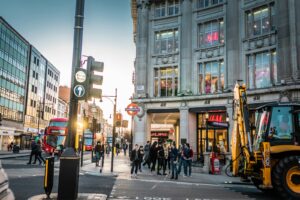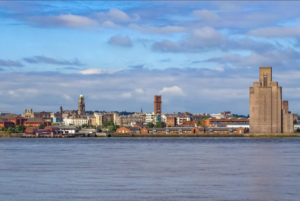
An artist’s impression of the future Albert Square, Manchester. Photo Credit – Manchester City Council.
Public squares play a key role in our towns and cities as beacons of democracy and regional identity. But is expanding them always the right thing to do? Chris Ogden reports for New Start.
In November 2019, Manchester City Council announced plans to reconfigure its main public square Albert Square as part of its Our Town Hall project, which aims to restore the city’s Victorian Town Hall by 2024.
The £13m project will see Albert Square, which is overlooked by the city’s grand neo-gothic Town Hall, expanded by 20% by pedestrianising the surrounding roads, making it comparable in size and style to continental European squares.
In its announcement, the council described Albert Square as ‘the heart of Manchester’, saying the expansion will make the square ‘one of the finest civic spaces in Europe’. Its bold language is striking.
To Cllr Nigel Murphy, deputy leader of Manchester City Council and leader of the Our Town Hall project, Manchester’s pride in Albert Square is deserved as it is vitally important to the city’s civic life.
Cllr Murphy pointed out the range of events the square already attracts, from its popular annual Christmas markets to spontaneous public celebrations or protests.
‘It’s hard not to go back to 2017,’ Cllr Murphy says. ‘Where did people want to come [after the Manchester Arena bombing] – one of our darkest hours, if it wasn’t our darkest hour in the city in my lifetime – when they wanted to come and feel that collectiveness? Albert Square was the place to do that, and that’s important.’
Cllr Murphy said he hoped the expansion will help Albert Square become an even better public space, one that’s ‘practical and multi-functional, but with character’: equally suitable for hosting local festivals as workers sitting down to admire the view on their lunch break.
Squaring the circle

Manchester’s ‘unloved’ Picadilly Gardens. Photo Credit – Manchester City Council.
Manchester’s pride for Albert Square contrasts with the unloved Piccadilly Gardens, another Manchester square which has faced its fair share of criticism in recent years.
Re-developed in the early 2000s, Piccadilly Gardens has attracted ire for its concrete pavilion – often likened to the Berlin Wall – and a reputation for attracting anti-social behaviour.
Last year, Manchester City Council said it would commission architects to draw up improvements to Piccadilly Gardens and make it a more family-friendly space, including more planting and improved design to deter anti-social behaviour.
When asked about Piccadilly Gardens, Cllr Murphy stressed the complexity of improving the space, which acts as one of Manchester’s main transport interchanges. Many of the buildings around it are also privately owned.
‘I think you’ve got to look at what spaces are available and what they’re there for,’ Cllr Murphy said. ‘I can remember being sat in [Piccadilly Gardens] with punks drinking and it not always being the most desirable place. Sometimes there’s a bit of a rose-tinted glasses view of how Piccadilly Gardens was.
‘The wall is talked about quite often, but the investment that’s gone back in recently has gone into the fountains where you see children playing, the play equipment in the top corner near [the Queen Victoria monument]. I think we’re in a better place than we were five or ten years ago.’
The council’s problems with Piccadilly Gardens show that it isn’t easy to get squares right. The Manchester-based Centre of Local Economic Strategies (CLES), the national organisation for local economies, welcomed the news that Albert Square would be further pedestrianised, saying it would help reduce car dominance in the city.
While CLES said that Manchester City Council’s scheme seems sensible and sensitive to the city centre’s needs, they warned that improving public spaces like this often tends to increase land value nearby. If councils aren’t careful, this can lead to local residents being displaced.
‘The High Line in New York is a really good case in point,’ said Helen Power, External Affairs Manager for CLES. ‘There’s some really good data, some mapping stuff, where you can see this property values bar chart. As you get closer to The High Line, it just goes like that [shoots arm up].
‘That’s what happens. You make a place more attractive; people move there; it gets even more attractive to live in, and the property prices go so high that actually they just become hotels and nobody lives there.’
Lessons from elsewhere
Manchester can learn from other cities in terms of how it handles its public squares. The London-based urban design practice Publica is currently working on Hanover Square, which has existed in Mayfair since the Georgian era.
While Hanover Square has long been swallowed by the West End, Publica’s design of the square aims to reassert its civic identity, making it an urban oasis for residents, workers and visitors.
With the support of Westminster City Council, as well as other bodies like the Great Portland Estate and Crossrail, the design will increase the square’s pedestrian and green space and re-establish its influence in the neighbourhood.
Publica is now helping with the detailed design and construction of the new Hanover Square, and puts the project’s success down to the willingness of the square’s stakeholders to work together.
‘The great thing in terms of Hanover Square is capturing all that energy from the local stakeholders and focusing it into one approach,’ said Matthew Hopkins, projects developer for Publica.
‘We could have ended up in a [situation with Hanover Square which is] essentially the outcome of what’s happened over a hundred or so years: people worrying about the bit outside of their front door, or doing piecemeal changes.
‘For us to be getting this buy-in from all the stakeholders and then obviously including Westminster [City Council] was a super-important thing for Hanover Square.’
The warmth of home
While there are advantages to reconfiguring our public squares, then, local authorities shouldn’t underestimate the value that they hold in the public imagination. Councils risk tinkering with them at their peril.
‘The warmth people have for Albert Square and the Town Hall is immense…’ Cllr Murphy said. ‘You see a picture of Manchester Town Hall and you know you’re home.’

















Leave a Reply